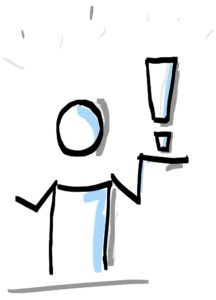This week I was invited to an event organized by the Münchner Bündnis gegen Depression. As a former burnout patient, I was given the opportunity to talk about what constitutes burnout depression and how one can find one’s way back to a healthy, content life. Or rather, of course, what made up MY situation and how I was able to do it.

It struck me – once again – how many people are moved by this issue. Many people are still affected by it. Above all, it once again became clear that despite regularly recurring “burnout waves” in the media, there is still a great need for information. Little is known about burnout or depression.
What is burnout? How does burnout develop? How is it related to depression? How is burnout triggered? How do I recognize it? What are the symptoms? What is a typical course? What can I do to prevent it? And most importantly: What should I do if I am hit by burnout?
Unawareness
is especially hard for people who slip into a burnout crisis acutely and seemingly unexpectedly. Not knowing prolongs the difficult, challenging, and usually very painful path out of this crisis.
“Burnt-out” people rarely know more about burnout than that this illness somehow exists. They often cannot understand why suddenly nothing seems to be working anymore and why nothing appears to be the same as it used to be just a few moments ago.
People affected then (rightly) feel powerless and helpless. And because family, partners, bosses, and colleagues often know just as little about this widely tabooed disease, they are overwhelmed and react accordingly. As a result, sufferers usually feel not only left alone in their unpleasant situation. They often are.
That is why I would like to encourage all those who are directly affected by burnout:
Burnout is an illness that can be treated. And it can be treated with an (almost) one hundred percent chance of recovery.
People at risk of burnout and those affected are not “over-sensitive wimps”. The exact opposite is the case – which is part of the problem. Most of them are performance-oriented, idealistic people. People who are used to being very hard on themselves. People who are willing to put their own needs aside for the sake of the “big idea”. And they often do this until they literally collapse.
Of course, such patterns of thinking and acting are dangerous or problematic, which people at risk often manage to ignore. People who are different, on the other hand, can often neither recognize nor understand where the actual problem lies. Then they react perplexed, with incomprehension and sometimes even a bit harshly (“What’s wrong with him/her again!”, “Pull yourself together!”, “What can I do about it…”).

This is why people who slip into burnout often feel misunderstood, unfairly treated, and victimized. And often rightly so. At the same time – and this is important – they are at least partly responsible for their own behavior and situation and are, therefore “perpetrators”.
The sooner you manage to recognise your own responsibility for the situation and actively stand up for yourself (and your own health), the sooner the recovery process can take place
 From their uncomfortable situation…
From their uncomfortable situation…
… burnout sufferers often try to free themselves with those distinctive means that brought them there: Idealism, achievement-oriented thinking, perseverance.
However, with burnout it is especially true that problems can never be solved by the same means that brought them about.
What is needed in the medium to long term is a change in attitude towards oneself and the environment. Coming out of the crisis and learning to think, act and feel differently and authentically at the same time is a complex, difficult and lengthy process. However, the effort usually pays off. Because it leads to a much more self-determined, satisfied, and healthier life than before the crisis.
If you are wondering…
… whether and to what extent you are affected by burnout: Have you read this far with self-interest? If so, it might be useful to find out more and perhaps take steps!
Informationen
- Telefonseelsorge: 0800/1110111 & 0800/1110222.
- Bundesverband der Angehörigen psychisch Kranker: 01805 950 951, 0228 71 00 24 24 oder seelefon@psychiatrie.de
- www.yourway2life.de: Website der Münchner Burnout-Selbsthilfegruppe. Ausführliche Hinweise zu Hilfsangeboten, Literatur- und Medienhinweise zu Burnout und Depression
- Münchner Bündnis gegen Depression
- www.therapie.de: Webpräsenz des Münchner Vereins Pro Psychotherapie. Sehr informativ, alles zum Thema Psychotherapie (Arten und Formen, Ablauf etc.). Mit Therapeutensuche.
- www.buendnis-depression.de: Deutsches Bündnis gegen Depression
- www.deutsche-depressionshilfe.de: Deutsche Depressionshilfe
- www.depressionsliga.de: Die Deutsche DepressionsLiga e.V. ist eine ehrenamtlich organisierte und bundesweit aktive Patientenvertretung für an Depressionen erkrankte Menschen.
- www.angstselbsthilfe.de: Als Verein organisierte Unterstützung von Menschen mit Angsterkrankung: Information, Beratung und Selbsthilfe bei Angsterkrankungen
- www.nakos.de: Bundesweite Informations- und Vermittlungsinstanz im Feld der Selbsthilfe in Deutschland
- www.suizidpraevention-deutschland.de
Nationales Suizid Präventions Programm für Deutschland. In Zusammenarbeit u.a. mit dem European Network on Suicide Research and Prevention, der Weltgesundheitsorganisatin (WHO) und unter der Beteiligung des Bundesministeriums für Gesundheit.
 From their uncomfortable situation…
From their uncomfortable situation…